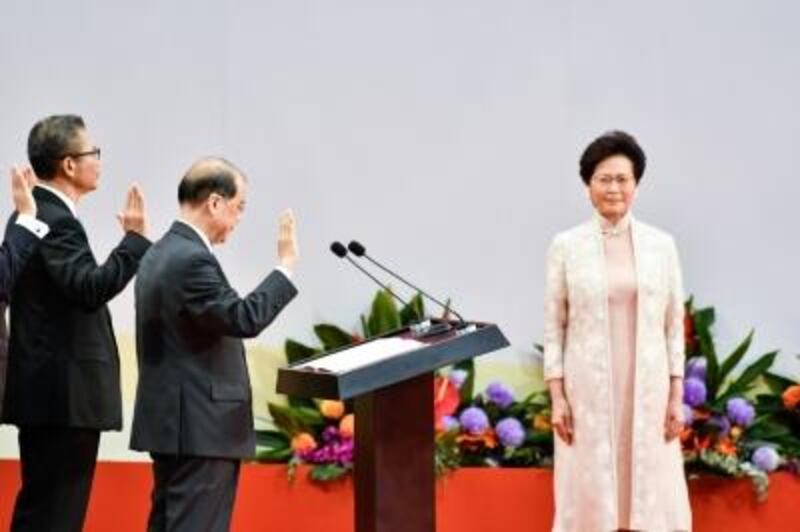HONG KONG // Chinese president Xi Jinping swore in Hong Kong's new leader on Saturday with a stark warning that Beijing will not tolerate any challenge to its authority in the divided city as it marked the 20th anniversary of its return from Britain to China.
Police blocked roads, preventing pro-democracy protesters from getting to the harbour-front venue close to where the last colonial governor, Chris Patten, tearfully handed back Hong Kong to China in the pouring rain in 1997.
Mr Xi said Hong Kong should crack down on moves towards "Hong Kong independence".
"Any attempt to endanger China's sovereignty and security, challenge the power of the central government … or use Hong Kong to carry out infiltration and sabotage activities against the mainland is an act that crosses the red line and is absolutely impermissible," Mr Xi said in a sweeping speech that touched upon the "humiliation and sorrow" China suffered during the first Opium War in the early 1840s that led to the ceding of Hong Kong to the British.
Hong Kong has been racked by demands for full democracy and, more recently, by calls by some pockets of protesters for independence, a subject that is anathema to Beijing.
Mr Xi's speech was his strongest yet to the city at a time of heightened social and political tensions and concerns over what some in Hong Kong perceive as increased meddling by Beijing in the city's affairs.
Under Hong Kong's mini-constitution, the Basic Law, the financial hub is guaranteed wide-ranging autonomy and freedoms for "at least 50 years" after 1997 under a "one country, two systems" formula praised by Mr Xi. It also specifies universal suffrage as an eventual goal.
But Beijing's refusal to grant universal suffrage to Hong Kong triggered nearly three months of street protests in 2014 that at times erupted into violent clashes and posed one of the greatest populist challenges to the central government in decades.
Mr Xi, dressed in a dark suit and striped red tie, was addressing a packed hall of dignitaries and mostly pro-Beijing establishment figures, speaking for more than 30 minutes, after swearing in Hong Kong's first female leader, Carrie Lam.
"I will, as I always have … firmly take actions in accordance with the law against any acts that will undermine the country's sovereignty, security and development interests," Ms Lam said after she was sworn in along with her cabinet.
Mr Xi hinted that the central government was in favour of Hong Kong introducing "national security" legislation, a controversial issue that brought nearly half a million people to the streets in protest in 2003 and ultimately forced former leader Tung Chee-hwa to step down.
"Hong Kong needs to improve its systems to uphold national sovereignty, security and development interests. It needs to enhance education and raise public awareness of history and culture of the Chinese nation," he said.
In the afternoon, tens of thousands gathered in sweltering heat in a sprawling park named after Britain's Queen Victoria, demanding Mr Xi allow universal suffrage. Organisers put the figure at more than 60,000.
"Xi shouldn't be interfering in Hong Kong too much," Peter Lau, a 20-year-old university student, said. "Despite him visiting garrisons and muscle-flexing, Hong Kong people's confidence will never be shaken. Especially for our generation. We should … fight for our freedom."
Some demonstrators marched with yellow umbrellas, a symbol of democratic activism in the city, and held banners denouncing China's Communist "one party rule".
Others criticised China's foreign ministry which on Friday said the "Joint Declaration" with Britain over Hong Kong, a treaty laying the blueprint over how the city would be ruled after 1997, "no longer has any practical significance".
* Reuters





